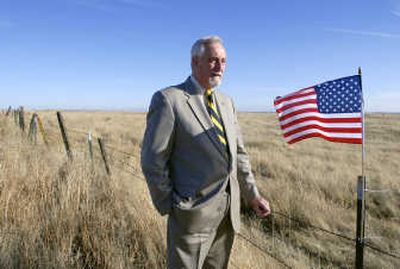New cemetery to be in Medical Lake

MEDICAL LAKE – Discarded beer bottles line the intersection of Espanola and Ritchey roads, but nearby three American flags hang on an old barbed wire fence to mark the future.
During the next two years, thick grass will supplant the sparse weeds, clean concrete will replace broken chunks of basalt, and monuments will rise across about 80 acres near west Medical Lake as the land transforms into the Eastern Washington State Veterans Cemetery.
The Washington Department of Veterans Affairs and a contracting firm spent months searching for a suitable location for the $7.8 million project, the first open veterans cemetery in the state.
“They looked at all of Eastern Washington,” WDVA chief financial officer Gary Condra said. “They looked at the topography and geography.”
The project is a long-term commitment to veterans in the region, he said. It needed to be on public land within close proximity to those veterans.
For easier construction, they wanted it as flat and open as possible, he said. They also tried to avoid distractions such as gas lines and railroads.
The WDVA is expected to pay a fair-market price of about $270,000 to buy the trust land from the state, Condra said. The 77 acres are between West Espanola Road and Hallett Road.
“It’s not treed,” he said of the property. “It’s fairly level. That area, there’s still a lot of basalt.”
Cemetery administrator Richard Cesler said construction should break ground on Nov. 11, 2008. Until then, he will be working with JGM Landscape Architects, Inc. to design the facility according to state and federal standards.
“There are a lot of specific design functions to a vet cemetery,” Cesler said.
The designers previously worked on a national veterans cemetery in Tahoma, Wash., and the Idaho State Veterans Cemetery, Cesler said. The architects must create designs that balance functional aspects with a beautiful and peaceful setting.
Cesler, acting as project coordinator, said he has received quite a bit of feedback regarding plans for the project.
“You can’t please everybody,” he said, “but we’re going to do our best to please as many as we can.”
Federal funding will pay for the design and construction, Condra said. The state will pay maintenance costs when the first 25 to 30 acres of Phase 1 development open on Nov. 11, 2009.
Cesler, who previously served two years as director of the Idaho State Veterans Cemetery, will oversee daily operations at the cemetery.
He is expected to manage a staff of five or six, who will take care of administrative tasks and maintain the grounds.
“I’m looking forward to working with the city of Medical Lake,” Cesler said.
He said he hopes some new residents, workers and increased traffic will give the city “a nice little economic boost.”
City Administrator Doug Ross said the project would be the city’s first large-scale cemetery. The city will make use of reclaimed water from town to irrigate the site.
“I think it’s a good thing,” he said. “I think it’s a real positive thing.”
Ross said WDVA representatives were easy to work with throughout the selection process. He said he could not predict much of an economic impact though there will be some increased traffic through town.
Medical Lake beat out several other sites in Washington and another proposed project in North Idaho, Cesler said. The new cemetery should supplement other closed veterans cemeteries west of the Cascades.
“This means an awful lot to the folks in Eastern Washington,” Cesler said.
Those with questions about internment can contact the department directly, he said.
Cesler said veterans are welcome to visit the site and post more American flags along the weathered fence in the months to come.
“It’s something that the veterans will be extremely proud of,” he said.